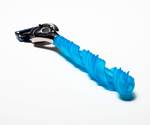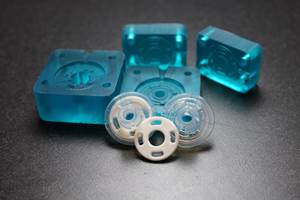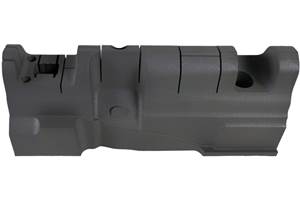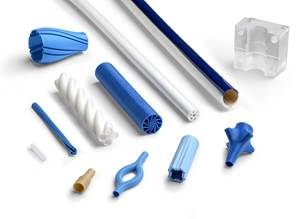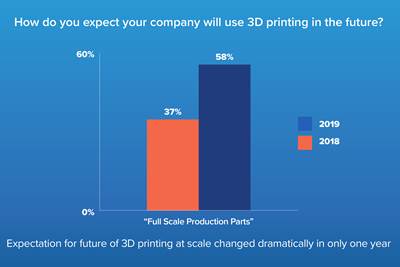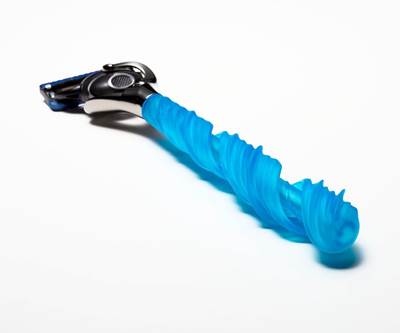3D Printing Helps Keep Production Going During the Coronavirus Crisis
Formlabs and Essentium both discuss how their companies are responding to the COVID-19 crisis and how 3D printing can help eliminate potential supply chain disruption.
Companies and governments are responding to the global coronavirus (COVID-19) crisis. However, unlike other technologies, 3D printing can eliminate potential supply chain disruption. Stephanie Hendrixson, senior editor at PT’s sister publication Additive Manufacturing, took its supplier directory that includes parts and tooling services and used this data to create a public Google Map that shows service providers across the United States. You can access the map here.
I checked in with Formlabs and Essentium to talk about the use of 3D printing during these uncharted times.
Can you talk about the state of manufacturing and 3D printing during the COVID-19 crisis?
Dávid Lakatos, Formlabs' Chief Product Officer:
Like almost every industry, manufacturing is facing a myriad of challenges during the COVID-19 outbreak, with the two biggest challenges being human labor and the supply chain. 3D printing can play a role in both areas.
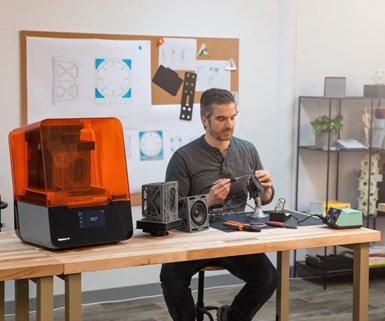
Formlabs says that accessible, professional 3D printers can be easily set up in locations that are not as affected by the novel coronavirus to keep production going.
China gave the world a preview of what we are now, and will be, experiencing. On the human labor side, Chinese factories that typically see roughly a 30 percent attrition rate after Chinese New Year saw attrition rates spike to over 50 percent. Coupled with government mandated shutdowns, overall factory production was impacted. While other regions may not be facing the same attrition issues, “shelter-in-place” and other government-mandated shutdowns are forcing manufacturers to curtail production.
In terms of supply chain, in the early days of the novel coronavirus epidemic, manufacturers faced delays, as well as increasingly expensive and limited volume supply chains.
3D printing has played, and will continue to play, an important role for manufacturers in both of these areas. Accessible, professional 3D printers can be easily set up in locations that are not as affected by the novel coronavirus to keep production going, and in some cases even distributed to individual engineers and designers' personal work areas to keep prototyping, design, and small batch production running. Teams that used to work shoulder to shoulder can now work remotely, sharing designs electronically and printing locally.
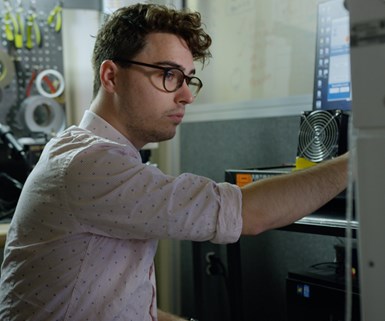
Essentium is working with customers to help ramp-up additive manufacturing.
Blake Teipel, CEO and Co-founder of Essentium Inc.:
We’re facing events unprecedented in modern times, no-one could have foreseen the speed at which manufacturers in China suspended operations and the impact on global supply chains. While China is recovering, manufacturers in other key markets are now stopping production and borders are closing to try to prevent the spread of the virus.
The situation has intensified the role additive manufacturing is set to play in supporting industrial supply chains that are impacted by traditional manufacturing and imports. Additive manufacturing enables a company to shift its sourcing of parts from remote locations like China to on-site production facilities. It also accelerates time to market, because they can print out the parts they need in a matter of hours, rather than wait days or weeks to receive the parts from a supplier.
We are seeing the benefits of the speed and innovation enabled by 3D printing. For example, in Northern Italy a local 3D printer designed and produced a replacement valve used for life-saving oxygen masks when the supplier to a major hospital had run out with no way to get more in a short time.
What are some of the ways your company is responding to it?
Dávid Lakatos, Formlabs' Chief Product Officer:
Formlabs is responding to this situation in three ways:
First and foremost, we are ensuring the safety and well-being of our employees. We have instituted work-from-home policies wherever possible, are limiting employee travel, and are taking many precautions to limit the spread of the virus.
Secondly, as a business we are employing various measures to ensure our company continues to meet the needs of our customers and the market. Thankfully Formlabs’ production and manufacturing operations have so far only had minimal impacts, and those areas of our supply chain that have been impacted are rebounding quickly as more factories reopen throughout the effected areas. Formlabs keeps a surplus of inventory in our warehouses to create a safety net for situations such as this where supply chains are challenged or interrupted. As production ramps up, we may have to expedite (airship) inventory from China to continue to be able to fulfill orders.
Blake Teipel, CEO and Co-founder of Essentium Inc.:
We’re working with customers to help identify how they can quickly ramp-up additive manufacturing, with its lower tooling requirements, which places less strain on the supply chain. So, the time it takes to go from design to customer delivery is much shorter, meaning they can get their products to market faster and in the hands of customers more easily.
Our long-term response is to advance our open ecosystem to allow customers to pick and choose their preferred materials. With the ongoing introduction of a wide variety of 3D-printable materials including high-temperature and durable polymers, manufacturers now can produce many more of the parts they need at industrial scale—quickly, reliably and repeatedly.
Is the company’s technology being used right now to produce any medical products needed to combat COVID-19?
Dávid Lakatos, Formlabs' Chief Product Officer:
Our users continue to amaze us with the innovative and groundbreaking ways they are using our technology to advance their industry, and the healthcare field is no exception. We are already aware of a couple dozen Formlabs customers using our technology for everything from coronavirus testing kits, to specific medical devices to help individuals recover from COVID-19. One example of this is Mologic, a diagnostic testing company based out of the United Kingdom that was recently given a grant by the UK government for COVID-19 research. Mologic is using Formlabs’ printers to rapidly prototype COVID-19 test kits.
Formlabs is looking for ways to help the medical community address the overall COVID-19 epidemic. We have many customers in the healthcare space already using Formlabs products for COVID-19 related projects, and recently launched the Formlabs Support Network for COVID-19 Response. This is an initiative to match Formlabs customers who are willing to use their printers to support healthcare needs with projects that could use their assistance. (The form to either request or offer help can be found here.)
Blake Teipel, CEO and Co-founder of Essentium Inc.:
Our first thought regarding medical equipment always tilts to the safety of the first responder or medical professional. No one is helped if there are devices produced hastily which may not be safe. That said, we are seeing a variety of ways that the Essentium High Speed Extrusion (HSE) 3D Printing Platform could address potential shortfalls in medical equipment supply from surgical masks to ventilation valves.
We stand ready to partner with medical agencies by lending a hand once it’s clear which components are in short supply, and can be produced safely using high speed 3D printing.
What advice do you have for customers and other manufacturers as they navigate these uncharted waters?
Dávid Lakatos, Formlabs' Chief Product Officer:
We would advise manufacturers to think of finding ways to shorten their supply chains and limit their exposure to global volatility by integrating 3D printing into their workflow. 3D printing eliminates potential supply chain disruption from things like trade wars or the coronavirus by bringing the creation of certain products in-house to remove the added risk of outsourcing essential jigs and fixtures.
Formlabs’ line of 3D printers enables companies to print the parts and tools they usually need to outsource in house, giving companies greater control over their supply chain. Bringing in parts under one roof speeds up time-to-market, saves money, eliminates waste materials, and generally streamlines the workflow.
We are heeding our own advice - at Formlabs, we have mitigated the impact of coronavirus on our own supply chain by introducing 3D printing into our manufacturing process. Specific components of our next generation printers are now being printed on the Form 3 to reduce costs and eliminate constraints on our supply chain. This reduces Formlabs’ susceptibility to supply chain disruptions and allows us to continue to bring cutting edge new products to market even in this time of uncertainty.
Blake Teipel, CEO and Co-founder of Essentium Inc.:
Manufacturers should be working to identify which parts currently purchased from a third-party supplier might be better developed internally. Many manufacturers are working furiously to qualify new suppliers around the world and source the parts they need at the lowest price. But, with additive manufacturing, they no longer need to source those parts from different suppliers. Instead, they can simply search the availability of materials and then begin the process of building those parts in-house. Not only will they reduce the time and money it once took to purchase and transport parts, they will greatly speed time to market, which is crucial in these unprecedented times.
Related Content
Freeform Injection Molding Eases the Path to Medical Device Product Testing
A development and manufacturing service provider is using dissolvable molds to build injection molded silicone prototypes.
Read More420 Stainless Steel Now Qualified With TrueShape 3D Printing Technology
NPE2024: Mantle's additive manufacturing technology is designed for precision tooling.
Read MoreDuPont Buys Medical Product Manufacturer Spectrum Plastics
Purchase price of $1.75 billion for leading supplier of extruded, molded, and 3D printed medical components.
Read MoreAdditive Technologies for Injection Mold Tooling Ride Tailwinds
NPE2024: Lowering barriers to additive manufacturing adoption in toolmaking.
Read MoreRead Next
Survey: Open Ecosystem is Important to Advance 3D Printing at Scale
About 162 managers and executives from large manufacturing companies across the world completed the survey on their current experiences, challenges and trends with 3D printing for production manufacturing.
Read MoreFormlabs, Gillette Partner On 3D-Printed Razor Handles
Dávid Lakatos, chief product officer at Formlabs, discusses the partnership along with 3D printing’s role in mass customization.
Read MoreLead the Conversation, Change the Conversation
Coverage of single-use plastics can be both misleading and demoralizing. Here are 10 tips for changing the perception of the plastics industry at your company and in your community.
Read More


